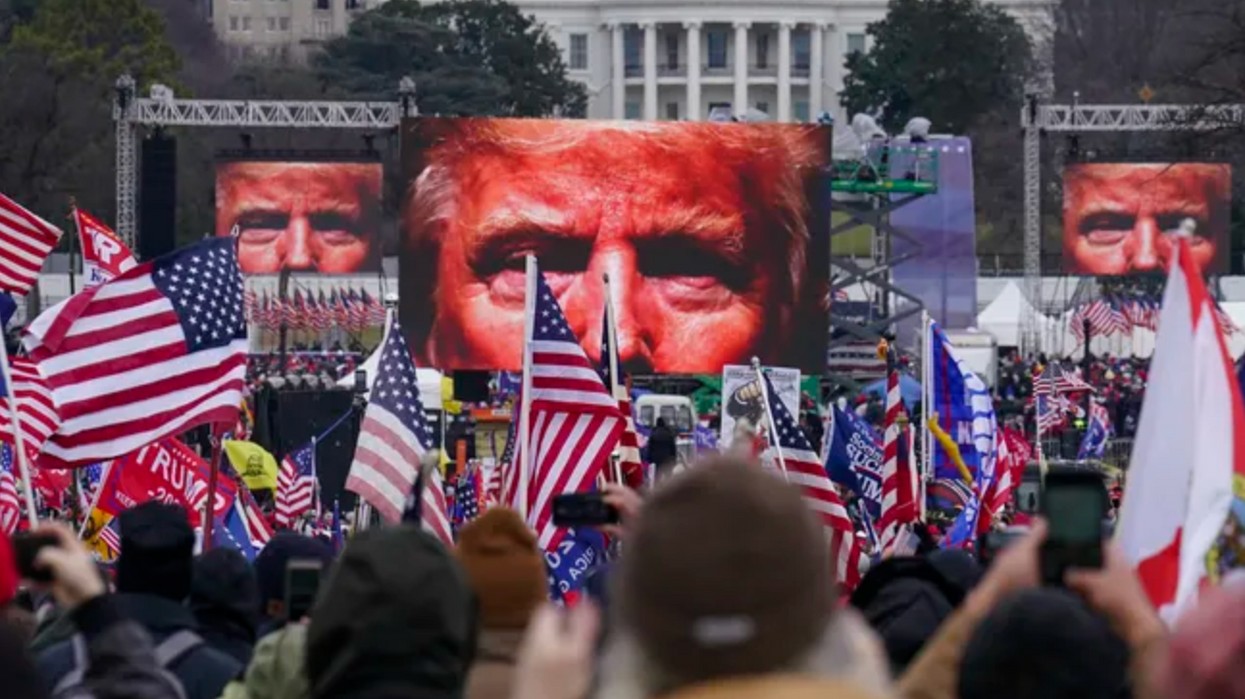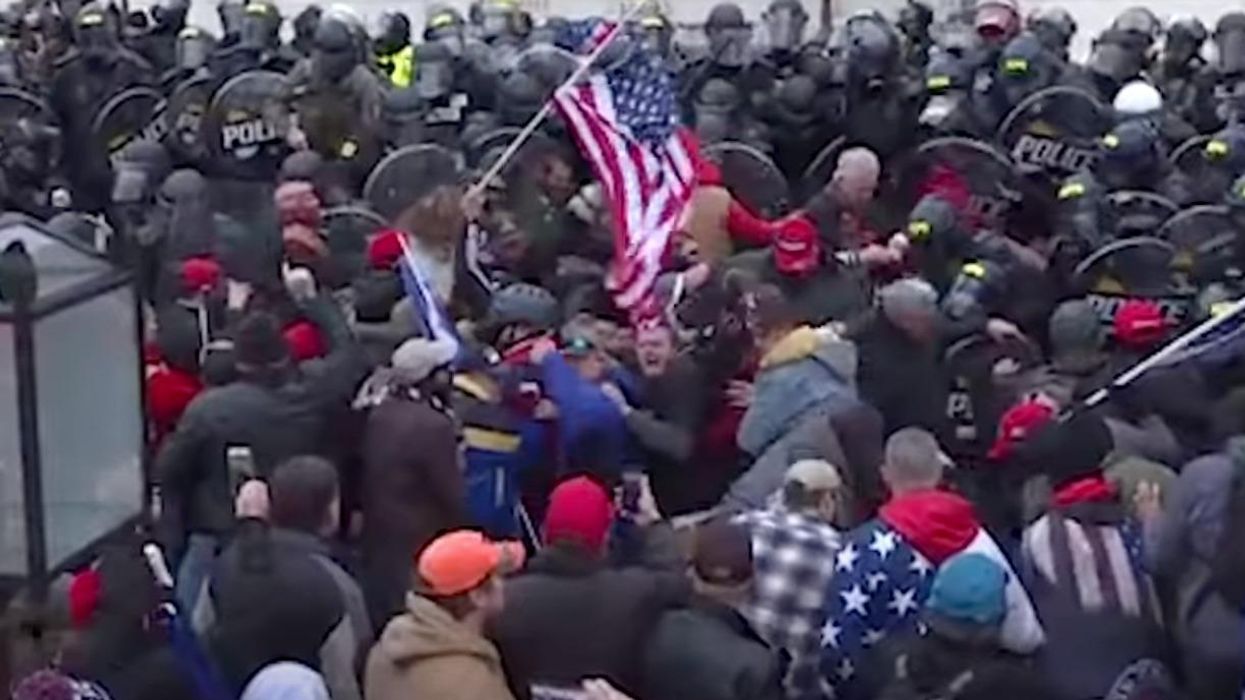Newly Revealed Memo Shows Trump Coup Plotted In Early December 2020
The New York Times has obtained a copy of the Dec. 6, 2020, memo written by Donald Trump-supporting lawyer Kenneth Chesebro that federal prosecutors have cited as a key piece of evidence in their case against Trump and, likely, against some of of his so-far-unindicted co-conspirators.
The contents of the memo aren't too surprising to anyone who was paying attention to the House investigation of the Trump White House's January 6, 2021, coup attempt. It does, however, spell out the intent of the co-conspirators quite plainly, as they hatched a plan for losing slates of Trump electors to sign documents purporting them to be their states' true electors, slates which would then be passed to Trump's vice president during the Jan. 6 joint session of Congress.
Quite a few Republican House and Senate blowhards have been trying to pass off their objections to certifying Trump's election loss as some sort of impotent protest vote. Nope. From the moment the plan was hatched, the co-conspirators intended it as a plan that would fraudulently overturn the election's results and reinstall Trump as president.
The memo written by Chesebro, identified only as co-conspirator 5 in the newest federal Trump indictment, proposed the plan that fellow co-conspirator John Eastman would quickly latch onto as the team's last-ditch strategy for nullifying the election: The Trump-Pence electors in all six allegedly "contested" states "must vote" and "send in the certificates containing their votes" on Dec. 14. It was to be portrayed to both the electors and the public as insurance, just in case Trump's legal team managed to score some implausible courtroom win that would change a state's vote totals, but after collecting those alleged "certificates" they were to be passed to Vice President Mike Pence—who would declare them to be the real electors based on his own say-so.
(c) On January in a solemn and constitutionally defensible manner, consistent with clear indications that this what the Framers of the Constitution intended and expected, and consistent with precedent from the first 70 years of our nation's history, Vice President Pence, presiding over the joint session, takes the position that it is his constitutional power and duty, alone, as President of the Senate, to both open and count the votes, and that anything in the Electoral Count Act to the contrary is unconstitutional.
This is, objectively an absolutely batshit argument to make—not in the least because according to the same logic, a vice president could pull any random gum wrapper out of his pocket, call it the official electoral slate of any random state, declare that it has added One Billion Electors to his preferred candidate, and not a single damn person in the country could overrule him. It is an inherently seditious plan, which is why even Chesebro immediately caveated the proposal to suggest that maybe he meant it and maybe he didn't.
I'm not necessarily advising this course of action, and the Vice President need not make a decision on how to proceed until January 6, and obviously there are many factors that will come to bear on how he proceeds, assuming the race has not been conceded before January 6. My point here is that it is important that the alternate slates of electors meet and vote on December 14 if we are to create a scenario under which Biden can be prevented from reaching 270 electoral votes, even if Trump has not managed by then to obtain court decisions (or state legislative resolutions) invalidating enough results to push Biden below 270.
The next paragraph, however, is perhaps the most illuminating. Again, many Republicans both before the coup attempt and after were insisting that the plan was not necessarily to reinstall Donald Trump as president: It was to declare the election results "disputed" and throw it to the House and Senate to resolve. Nope. The plan from the beginning wasn't just for Biden to lose, but for the vice president to engineer the vote count so that "officially," as the counting continued, Donald Trump was always ahead.
Again, I'd be happy to elaborate further on the January 6 scenario I have in mind, but provided the three conditions above are met, unless I am missing something, I believe that what can be achieved on January 6 is not simply to keep Biden below 270 electoral votes. It seems feasible that the vote count can be conducted so that at no point will Trump be behind in the electoral vote count unless and until Biden can obtain a favorable decision from the Supreme Court upholding the Electoral Count Act as constitutional, or otherwise recognizing the power of Congress (and not the President of the Senate) to count the votes.Specifically—but only if all six States are still contested, and all six slates of Trump-Pence electors had voted on December 14—I think the count could be managed so that Biden would have to seek Supreme Court review either when he is behind 12-0 in the electoral count or, at latest, when he is behind 232-227.
This sounds more than a little like the ploys used by the George W. Bush legal team to "win" the state of Florida during Bush's 2000 presidential bid. Pence was to "conduct" the vote count so that Biden electors were dropped and Trump electors were inserted in such a way as to keep Trump in the lead throughout the counting; the only recourse available to the Biden camp would be to somehow interrupt the count, convince Supreme Court Chief Justice John Roberts to abandon his position presiding over the congressional vote counting and return to the Supreme Court, assemble the justices, and issue a ruling declaring that Pence could not in fact pull gum wrappers out of his pockets and declare them the new electoral slates.
And through this whole process, however long it took, the "official" tally of electoral votes in Congress would be conducted so that the television screens showed Trump, not Biden, to have more votes.
Even if, in the end, the Supreme Court would likely end up ruling that the power to count the votes (in the sense of resolving controversies concerning them) does not lie with the President of the Senate, but instead lies with Congress (either voting jointly, or in separate Houses), letting matters play out this way would guarantee that public attention would be riveted on the evidence of electoral abuses by the Democrats, and would also buy the Trump campaign more time to win litigation that would deprive Biden of electoral votes and/or add to Trump's column.I recognize that what I suggest is a bold, controversial strategy, and that there are many reasons why it might not end up being executed on January 6. But as long as it is one possible option, to preserve it as a possibility it is important that the Trump-Pence electors cast their electoral votes on December 14.
What we have there is the "bold" strategy in a nutshell. The plan was to convince Pence to count the votes fraudulently, even if it was "likely" that even the archconservative Supreme Court would slap the plan down as obviously illegal. At worst, the act of attempted sedition would "rivet" the public attention on the exact same hoaxes Trump's team had been concocting to justify the conspiracy to begin with; at best it would provide another bare scrap of time for Trump's team to concoct some new theory that would pass muster with the Supreme Court.
All of it hinged, however, on Pence going along with the criminal scheme of introducing fake electoral certificates to Congress as if they were the real ones. Pence resisted that plan—and kept resisting even as Trump himself continued to pressure and threaten him. The conspirators were able to gain the cooperation of Trump-backing state electors and numerous Republican senators and members of Congress, but not Pence.
That failure led to another escalation of the conspiracy: Coordinating with Republican allies, Trump endorsed and promoted a Jan. 6 "march" to the Capitol in which his most fervent supporters were to confront Congress and Pence to demand the election's result be overturned. Trump was even made aware that the crowd was armed, as he prepared to address them before the "march," and demanded security stations let the crowd through anyway.
The point of the march was to construct a mob that would provide an immediate and very real threat to anyone inside the building who objected to the elector-swapping plan. And Trump identified, by name, Mike Pence as the man that needed the most threatening.
The rest of the memo is fluff attempting to justify the rest, but the "bold, controversial strategy" of Trump and his co-conspirators was laid out by December 6 and was quickly adopted as each of the team's previous false claims were thrown out by sometimes-angry, sometimes-incredulous judges. Pence was to pocket up to six states’ worth of fraudulent "electors," declare them to be real, declare Trump to be leading in the electoral count, and dare the Supreme Court to contradict the plan even as a pre-staged, armed, and angry mob threatened violence or rebellion if they did.
It's just a little bit astonishing to read it, yet again, and realize that the Trump team fully intended their acts as a coup. They didn't know whether it would succeed, or whether the Supreme Court would back them, or what the military implications would be if Pence's one-person unilateral reversal of state vote totals resulted in what would assuredly have been massive civil unrest, but they carried out the plan nonetheless.
It's difficult to even put it in historical context; it was a genuine coup attempt, carried out inside the Oval Office itself, and one that quickly gained the backing of a sizable chunk of both Republican elected officials and the party's functionaries.
Reprinted with permission from Daily Kos.












